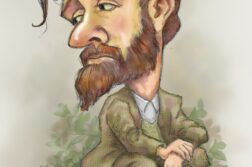 For the Ferryman: A Personal History
For the Ferryman: A Personal History
by Charles Silverstein
Chelsea Station Editions
340 pages, $20
AN ACTIVIST since the early 1970’s, Charles Silverstein was one of the key petitioners at the American Psychiatric Association’s 1973 “Nomenclature Committee.” He argued successfully for the removal of homosexuality as a category of mental illness in the APA’s Diagnostic and Statistical Manual—a critical development which, as Silverstein argues in his new memoir, has had profound social, cultural, and political consequences on an international scale. Like many gay men of his generation, he oscillated between closeted self-denial and the self-destructive pursuit of a succession of best friends who each turned out straight: Steve, Pete, Mark, all documented in For the Ferryman. He spent seven years trying to turn heterosexual, undergoing a range of psychiatric treatments that he now characterizes as “futile, guilt-producing and expensive exercises in sexual repression.” Only at 35 did he resign himself to his sexual character, still having “no idea what homosexuals were like as people.”
Professionally, Silverstein made up for lost time and proved both ambitious and energetic, opening two of the first counseling centers for gay people anywhere. He was also founding editor of the Journal of Homosexuality, a key catalyst in promoting the notion of GLBT studies before such a thing existed. Most of Silverstein’s subsequent publications have concerned counseling and psychotherapy, but he is best known among lay readers for the more accessible The Joy of Gay Sex, co-authored with novelist Edmund White in 1977.





